|
|
|
Sort Order |
|
|
|
Items / Page
|
|
|
|
|
|
|
| Srl | Item |
| 1 |
ID:
168928
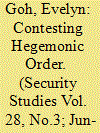

|
|
|
|
|
| Summary/Abstract |
This paper develops an English School–informed approach to theorize hegemonic order using an explicitly social lens. It conceptualizes the architecture of hegemonic order as consisting of three social elements—compact, structure, and processes—and emphasizes social exchange, power relationships, and negotiation as the bridges linking hegemony and order. Using the most significant contemporary case of hegemonic contestation, it employs this hegemonic order framework to analyze how, and with what effects on systemic change, China is contesting the US-led hegemonic order in East Asia. It finds that variation in the forms and effects of Chinese contestation in the security, institutional, and economic domains is explained by differences in the robustness of the US hegemonic social compact, and the complexity of the regional social structure.
|
|
|
|
|
|
|
|
|
|
|
|
|
|
|
|
| 2 |
ID:
168923


|
|
|
|
|
| Summary/Abstract |
Since the onset of the 2008 financial crisis, there has been a running debate among international relations scholars about the future of the open liberal economic order. In many ways, however, this debate has generated more heat than light. Little thought has been given to considering the theory and process of great-power revisionism in the global political economy. In the presence of an existing hegemonic order, how would a rational revisionist develop a viable, peaceful counter-hegemonic strategy? This paper considers what a counter-hegemonic approach would look like in the absence of a great-power war. Building on Susan Strange’s concept of structural power, this paper concludes that there is an optimal revisionist sequence to challenge a hegemonic economic order. Such a sequence prioritizes attacking the ideational dimensions of the order before its material dimensions.
|
|
|
|
|
|
|
|
|
|
|
|
|
|
|
|
| 3 |
ID:
168926
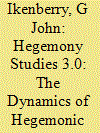

|
|
|
|
|
| Summary/Abstract |
After the end of World War II, various iterations of hegemony studies focused on such topics as the connection between hegemonic powers and the provision of international public goods, the causes of war during hegemonic transitions, and the stability of hegemonic orders. In this article, we discuss and forward the emergence of a new wave of international hegemony studies. This research program concerns itself with the politics of hegemonic orders and hegemonic ordering. It treats hegemonic orders as means, mediums, and objects of cooperation and contestation. It sees hegemons as not simply order makers but also order takers whose domestic political processes significantly interact with the dynamics of international order. It incorporates insights about how different dimensions of hegemonic orders interact to shape the costs and benefits of hegemony. In short, it treats hegemony and hegemonic orders as objects of analysis amenable to multiple theoretical perspectives and methodological approaches.
|
|
|
|
|
|
|
|
|
|
|
|
|
|
|
|
| 4 |
ID:
168925


|
|
|
|
|
| Summary/Abstract |
Great Britain was more successful at organizing the politics of the Middle East, maintaining its clients and securing its interests, during the interwar period when it could credibly be claimed to be the hegemon in the region, than did the United States during its period of regional dominance. That difference is best explained not by relative power disparities or the styles of regional management practiced by London and Washington, but by changes in the infrastructural power of the local actors and changes in the relationship between the local actors and the would-be hegemons to the institutions of international governance.
|
|
|
|
|
|
|
|
|
|
|
|
|
|
|
|
| 5 |
ID:
168921


|
|
|
|
|
| Summary/Abstract |
Many theories of hegemonic orders assume that systemic incentives will discipline the hegemon to maintain a status quo policy supporting that order. These theories make too strong a claim that domestic actors will not see any self-interested gain in opposing hegemony or strategies necessary for hegemony. Yet policies sustaining hegemony are unlikely to remain perpetually exempt from domestic political contestation. Indeed, US political institutions—especially political parties—may provide incentives for actors to undermine hegemony in order to reward their core constituencies or to distinguish their electoral brand from a rival party. Whether by producing overt policy shocks, through diminished expectations of gains from future cooperation by other states, or some combination of the two, these processes can erode the foundations of hegemonic order. This threat to international order has been illustrated by the 2016 US election, but the conditions that produced that result were present long before and would have persisted regardless of the outcome.
|
|
|
|
|
|
|
|
|
|
|
|
|
|
|
|
| 6 |
ID:
168927
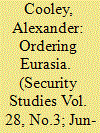

|
|
|
|
|
| Summary/Abstract |
Following the collapse of the Soviet Union, the post-Communist states were integrated at light speed into the organizations, institutions, and norms of the liberal international order. During the 1990s, Western regional organizations, nongovernmental organizations, and democratic norms became important pillars of an international security and governance architecture that seemingly locked in the post-Communist states, whose regimes were eager to derive the material benefits and status of anchoring themselves into the US-led liberal hegemonic order. Since 2005, however, many of the post-Communist governments increasingly view these Western pillars as threatening their domestic authority and regime survival and have actively supported Russian-led initiatives to curtail such organizations and norms’ reach and influence. As a result, the ecology of the post-Communist space has transformed from one where the liberal order was briefly dominant to one where new illiberal regional organizations, practices, and counternorms have flourished and now regularly interact with liberal counterparts.
|
|
|
|
|
|
|
|
|
|
|
|
|
|
|
|
| 7 |
ID:
168922
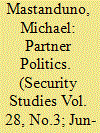

|
|
|
|
|
| Summary/Abstract |
Hegemonic-order theory draws attention to relationships of asymmetrical power and legitimate consent. This article emphasizes the importance of “lynchpin partnerships” in the maintenance of hegemonic order. The postwar US order relied on partnerships with Germany and Japan, and after the Cold War the United States sought to enlarge its hegemony by offering partner bargains to Russia and China. The terms of partnership differed significantly based on the relative significance of each state to the management of America’s hegemonic order. That order is now in jeopardy given that the partnership with Russia failed, while that with China succeeded for two decades but is now under considerable strain. The US experience suggests that hegemonic orders are easier to establish than to extend, and, since the dominant state controls the terms of entry, liberal hegemonic orders are easier for some states to join than for others.
|
|
|
|
|
|
|
|
|
|
|
|
|
|
|
|
| 8 |
ID:
168920


|
|
|
|
|
| Summary/Abstract |
When and under what conditions does hegemony pay? The fate of any hegemonic order hinges on the answer to this question. Notwithstanding major relevant research traditions, international relations scholarship remains poorly equipped to answer it. We fill this gap with a theoretical framework for understanding the costs and benefits of hegemony that identifies the conditions that affect potential complementarity between military protection and economic production. We show how this relationship varies in different international systems in ways that confounded previous research. Contrary to widely held views in US domestic politics and in the security studies research community, we argue that under current conditions complementarity between protection and production means the maintenance of hegemonic order remains beneficial to the United States.
|
|
|
|
|
|
|
|
|
|
|
|
|
|
|
|
| 9 |
ID:
168924
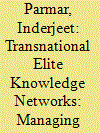

|
|
|
|
|
| Summary/Abstract |
The liberal international order’s own theory is as much in crisis as the institutional system whose virtues it champions. This is due first to theoretical shortcomings per se, and due second to its misunderstanding or neglect of the role of elite knowledge networks and of socialization in the development and perpetuation of American liberal hegemony. This article, which adds to recent interest in the dynamics of hegemonic-order building and maintenance, argues that a neo–Gramscian-Kautskyian theoretical synthesis better explains the character and methods of the liberal international order. The article considers two cases through which to compare liberal-internationalist and Gramscian-Kautskyian claims: the 1970s challenge of third-world states under the banner of a new international economic order (NIEO) and the managed opening of China, and the Trumpian challenge to the liberal international order. On that basis, the article concludes that the hegemonic liberal international order and its core states and elite networks are engaged in a titanic struggle against forces unleashed by a combination of its own successes, inadequacies, and exclusions. Gramscian-Kautskyian theory, using the transnationally extended “elite knowledge network” concept, also suggests that, despite turbulence, the hegemonic liberal international order has significant powers of adaptation, co-optation, and resistance, and is likely to remain resilient, if turbulent and not unchanged, for the foreseeable future.
|
|
|
|
|
|
|
|
|
|
|
|
|
|
|
|
|
|
|
|
|